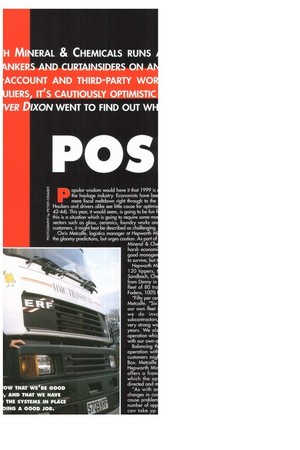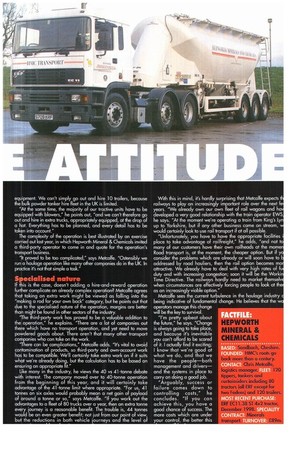HMI ERAL & CHEMICALS RUNS NKER URTI I IDER ACCOUNT AND THIRD-PARTY WO
Page 36

Page 37

If you've noticed an error in this article please click here to report it so we can fix it.
LIERS, IT'S CAUTIOUSLY OPTIMISTIC VER 1 IXON WENT TO FIND OUT WH
opular wisdom would have it that 1999 is
cc< the haulage industry. Economists have I mere fiscal meltdown right through to the ILE Hauliers and drivers alike see little cause for optimis a42-44). This year, it would seem, is going to be fun this is a situation which is going to require some ma sectors such as glass, ceramics, foundry works an customers, it might best be described as challenging. 0,— Chris Metcalfe, logistics manager at Hepworth M I_ the gloomy predictions, but urges caution. As part of Mineral & Ch harsh economi good manage to survive, but t
Hepworth M 120 tippers, Sandboch, Ch from Denny in fleet of 80 tra Fodens, 100% "Fifty per ce Metcalfe. "Six our own fleet we do inv subcontractors very strong w years. We al operation whic with our own Balancing t operation wit customers mig Box. Metcalfe Hepworth Mi offers a from which the op directed and "As with a changes in cus cause problem number of ap can take up equipment. We can't simply go out and hire 10 trailers, because the bulk powder tanker hire fleet in the UK is limited.
"At the same time, the majority of our tractive units have to be equipped with blowers," he points out, "and we can't therefore go out and hire in extra trucks, appropriately equipped, at the drop of a hat. Everything has to be planned, and every detail has to be taken into account," The complexity of the operation is best illustrated by an exercise carried out last year, in which Hepworth Mineral & Chemicals invited a third-party operator to come in and quote for the operation's transport business.
"It proved to be too complicated," says Metcalfe. "Ostensibly we run a haulage operation like many other companies do in the UK. In practice it's not that simple a task."
Siecirlised nature
If t is is the case, doesn't adding a hire-and-reward operation further complicate an already complex operation? Metcalfe agrees that taking on extra work might be viewed as falling into the "making a rod for your own back" category, but he points out that due to the specialised nature of the operation, margins are better than might be found in other sectors of the industry. 'The third-party work has proved to be a valuable addition to the operation," he explains. "There are a lot of companies out there which have no transport operation, and yet need to move powdered goods about. There aren't that many other transport companies who can take on the work. "There can be complications," Metcalfe adds. "It's vital to avoid contamination of products, so third-party and own-account work has to be compatible. We'll certainly take extra work on if it suits what we're already doing, but the calculation has to be based on ensuring an appropriate fit."
Like many in the industry, he views the 40 vs 41-tonne debate with interest. The company moved over to 40-tonne operation From the beginning of this year, and it will certainly take advantage of the 41-tonne limit where appropriate. "For us, 41 tonnes on six axles would probably mean a net gain of payload of around a tonne or so," says Metcalfe. "If you work out the advantages to a fleet of 80 trucks over a year, then an extra tonne every journey is a reasonable benefit. The trouble is, 44 tonnes would be an even greater benefit; not just from our point of view, but the reductions in both vehicle journeys and the level of
With this in mind, it's hardly surprising that Metcalfe expects th railways to play an increasingly important role over the next fe years. "We already own our own fleet of rail wagons and ha developed a very good relationship with the train operator EWS he says. "At the moment we're operating a train from King's Lyn up to Yorkshire, but if any other business came on stream, would certainly look to use rail transport if at all possible. "Unfortunately, you have to have the appropriate facilities i place to take advantage of railfreight," he adds, "and not to many of our customers have their own railheads at the momen Road transport is, at the moment, the cheaper option. But if y consider the problems which are already or will soon have to addressed by road hauliers, then the rail option becomes mo attractive. We already have to deal with very high rates of fu duty and with increasing congestion; soon it will be the Workin Time Directive. The railways hardly need to market themselv when circumstances are effectively forcing people to look at the as an increasingly viable option." Metcalfe sees the current turbulence in the haulage industry being indicative of fundamental change. He believes that the w operators manage this change will be the key to survival. "I'm pretty upbeat about the future," he says. "Change is always going to take place, and because it's inevitable you can't afford to be scared of it. I actually find it exciting; I know that we're good at what we do, and that we have the people—both management and drivers— and the systems in place to carry on doing a good iob.
"Arguably, success or failure comes down to controlling costs," he concludes. "If you can achieve this, you have a good chance of success. The more costs which are under your control, the better this








































































































